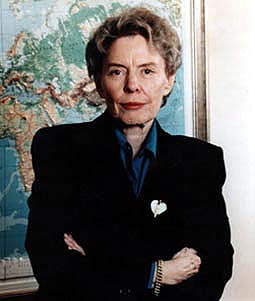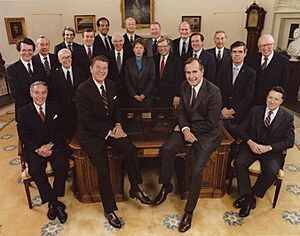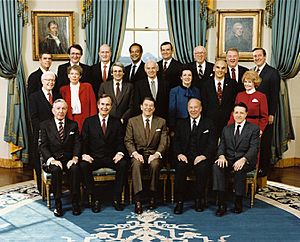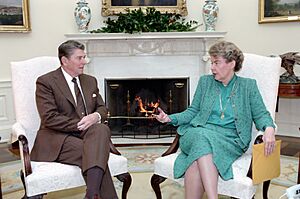Jeane Kirkpatrick facts for kids
Quick facts for kids
Jeane Kirkpatrick
|
|
|---|---|
 |
|
| 16th United States Ambassador to the United Nations | |
| In office February 4, 1981 – April 1, 1985 |
|
| President | Ronald Reagan |
| Preceded by | Donald McHenry |
| Succeeded by | Vernon Walters |
| Personal details | |
| Born |
Jeane Duane Jordan
November 19, 1926 Duncan, Oklahoma, U.S. |
| Died | December 7, 2006 (aged 80) Bethesda, Maryland, U.S. |
| Political party | Socialist (1945–1948) Democratic (1948–1985) Republican (1985–2006) |
| Spouse | Evron Kirkpatrick |
| Children | 3 |
| Education | Barnard College Columbia University (BA, MA, PhD) |
Jeane Duane Kirkpatrick (born Jordan; November 19, 1926 – December 7, 2006) was an important American diplomat and political scientist. She played a big part in the foreign policy of President Ronald Reagan's government. She was strongly against communism.
Kirkpatrick started as a Democrat but later became a neoconservative. She switched to the Republican Party in 1985. After helping Ronald Reagan in his 1980 presidential campaign, she made history. She became the first woman to be the United States Ambassador to the United Nations.
Contents
Jeane Kirkpatrick's Early Life
Jeane Kirkpatrick was born in Duncan, Oklahoma, on November 19, 1926. Her father, Welcher F. Jordan, worked in oil fields. Her mother was Leona Kile. When she was 12, her family moved to Mt. Vernon, Illinois. She finished high school there.
She went to Stephens College and then to Barnard College at Columbia University. In 1968, she earned her PhD in political science from Columbia. She also studied in Paris, which helped her learn French. She was also fluent in Spanish.
From Socialist to Conservative
When she was a college freshman in 1945, Jeane joined the Young People's Socialist League. This was the youth group of the Socialist Party of America. Her grandfather, who helped start the Populist and Socialist parties in Oklahoma, influenced her.
Later, she became a professor at Georgetown University in 1967. In the 1970s, she became active in politics as a Democrat. She supported politicians like Hubert Humphrey and Henry M. Jackson. Like many people around Henry Jackson, she became known as a neoconservative.
She disagreed with some Democratic policies, especially President Jimmy Carter's foreign policy. She wrote an important article called "Dictatorships and Double Standards" in 1979. In this article, she talked about the difference between authoritarian and totalitarian governments. She suggested that sometimes the U.S. might need to work with authoritarian governments if it helped American goals.
A Career in Diplomacy
Ronald Reagan noticed Jeane Kirkpatrick's article. He asked her to be his foreign policy adviser during his 1980 presidential campaign. After he won, she became the United States Ambassador to the United Nations. She held this job for four years.
The Kirkpatrick Doctrine
Kirkpatrick was known for her "Kirkpatrick Doctrine." This idea suggested that the U.S. should support authoritarian governments around the world if they agreed with American goals. She believed these countries could eventually become democracies. She wrote that "traditional authoritarian governments are less repressive than revolutionary autocracies."
For example, during the Falklands War in 1982, she felt sympathy for the Argentine government. This was different from President Reagan, who supported British Prime Minister Margaret Thatcher.
Working in Reagan's Cabinet
Kirkpatrick was part of Reagan's Cabinet. She served on the National Security Council and other important boards. After leaving government in 1985, she wrote a newspaper column. She often wrote about the activities of the United Nations.
She sometimes had disagreements with other members of the Cabinet. For instance, she disagreed with Secretary of State George Shultz about the Iran–Contra affair. She supported using money from arms sales to help the Contras in Nicaragua. Shultz thought this was wrong.
Ambassador to the United Nations
Jeane Kirkpatrick once said that the Security Council sometimes felt more like a "mugging" than a debate. However, she also came to respect the UN's power to decide what is right and wrong in the world. She noticed that the United States was sometimes becoming isolated in the UN. She felt this was a sign of weakness, especially since the UN could influence international opinions.
She was the UN ambassador when the Soviet Union shot down Korean Air Lines Flight 007 in 1983. This plane had 269 people on board, including a U.S. congressman. Kirkpatrick played an audio recording of the Soviet pilot during the attack to the Security Council. This made it impossible for the Soviet Union to deny what happened.
Kirkpatrick was a strong supporter of Israel. She believed that the UN often unfairly criticized Israel. She saw this as politically motivated. She stepped down from her role as UN Ambassador in April 1985, as she had planned to serve only one term.
Later Years
In April 1985, Jeane Kirkpatrick officially became a Republican. She went back to teaching at Georgetown University. She also became a fellow at the American Enterprise Institute, which is a think tank in Washington D.C. She co-founded Empower America, a group focused on public policy, in 1993.
She thought about running for president in 1988 but decided not to. She supported Senator Robert Dole in that election. After the September 11 attacks in 2001, she called for the U.S. Congress to declare war on terrorist groups. In 2003, she led the U.S. delegation to the United Nations Commission on Human Rights.
Personal Life
Jeane Kirkpatrick was a Presbyterian. She married Evron Maurice Kirkpatrick in 1955. He was a scholar and had worked for the O.S.S. (an early version of the CIA). Her husband passed away in 1995. They had three sons: Douglas Jordan, John Evron, and Stuart Alan.
Jeane Kirkpatrick had heart disease for several years. She died at her home in Bethesda, Maryland, on December 7, 2006. She was 80 years old.
Awards and Legacy
In 1985, Jeane Kirkpatrick received the Presidential Medal of Freedom. This is the highest award a civilian can get in the United States. Harvard Kennedy School created a special professorship in her honor.
She also received the Simon Wiesenthal Center's Humanitarian Award in 1983. She was given honorary degrees from several universities. In 1994, she declined an honorary degree from Brandeis University because some professors and students protested it. They felt she supported policies that harmed human rights in Latin America.
In 1984, Kirkpatrick was inducted into the Oklahoma Women's Hall of Fame. After her death, the Conservative Political Action Conference (CPAC) created the Jeane Kirkpatrick Academic Freedom Award in her honor.
Books by Jeane Kirkpatrick
Jeane Kirkpatrick wrote many books and articles about politics and foreign policy. Here are some of her well-known books:
- Making War to Keep Peace, 2007
- The Withering Away of the Totalitarian State...and Other Surprises, 1992
- Legitimacy and Force: National and International Dimensions, 1988
- Dictatorships and Double Standards: Rationalism and Reason in Politics, 1982
- Political Woman, 1974 (This was an important study about women in American politics.)
She also edited a book in 1963 called The Strategy of Deception: A study in world-wide Communist tactics.
Images for kids
See also
 In Spanish: Jeane Kirkpatrick para niños
In Spanish: Jeane Kirkpatrick para niños
 | Frances Mary Albrier |
 | Whitney Young |
 | Muhammad Ali |








